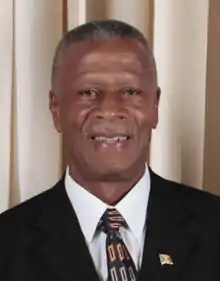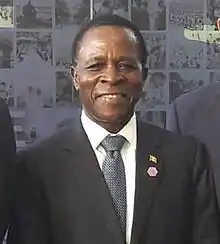2008 Grenadian general election
General elections were held in Grenada on 8 July 2008. Out of a total of fifteen seats, the opposition National Democratic Congress (NDC) won eleven seats and the governing New National Party (NNP) won four, bringing the NDC to power for the first time since 1995.[1] The NNP was looking for a fourth consecutive term in power, which would have been a first in Grenadian history.[2]
| ||||||||||||||||||||||||||||
All 15 seats in the House of Representatives of Grenada | ||||||||||||||||||||||||||||
|---|---|---|---|---|---|---|---|---|---|---|---|---|---|---|---|---|---|---|---|---|---|---|---|---|---|---|---|---|
| ||||||||||||||||||||||||||||
 Colours denote the winning party, as shown in the main table of results. | ||||||||||||||||||||||||||||
| ||||||||||||||||||||||||||||
 |
|---|
| This article is part of a series on the politics and government of Grenada |
| Administrative divisions (parishes) |
Campaign
In its election manifesto, which it debuted on June 25, 2008, the NNP promised the creation of 4,000 jobs, along with 4% growth in the economy.[3]
Opinion polls
A poll conducted by the Caribbean Development Research Services from June 6 to June 9 showed the NNP with 36.4% support, the NDC with 32.3% support, the Grenada United Labour Party (GULP) with 1.1% support, and the People's Labour Movement (PLM) with 0.8% support.[3] The two later formed an electoral alliance, the Labour Platform.
Results
In one notable outcome of the election, Deputy Prime Minister Gregory Bowen of the NNP was defeated in his constituency of St. George South East by Pastor Karl Hood of the NDC.[4] Mitchell was re-elected from the constituency of St. George North West.[5] Complete results are as follows:[6]
| Party | Votes | % | Seats | +/– | |
|---|---|---|---|---|---|
| National Democratic Congress | 29,007 | 51.17 | 11 | +4 | |
| New National Party | 27,189 | 47.96 | 4 | –4 | |
| Labour Platform (GULP–PLM) | 478 | 0.84 | 0 | 0 | |
| Independents | 12 | 0.02 | 0 | 0 | |
| Total | 56,686 | 100.00 | 15 | 0 | |
| Valid votes | 56,686 | 99.61 | |||
| Invalid/blank votes | 222 | 0.39 | |||
| Total votes | 56,908 | 100.00 | |||
| Registered voters/turnout | 71,751 | 79.31 | |||
| Source: Caribbean Elections | |||||
Elected members
| Constituency | Member | Party |
|---|---|---|
| Carriacou and Petite Martinique | Elvin Nimrod | New National Party |
| Saint Andrew North East | Roland Bhola | New National Party |
| Saint Andrew North West | Alleyne Walker | National Democratic Congress |
| Saint Andrew South East | Patrick Simmons | National Democratic Congress |
| Saint Andrew South West | Sylvester Quarless | National Democratic Congress |
| Saint David | Denis Lett | National Democratic Congress |
| Saint George North East | Nazim Burke | National Democratic Congress |
| Saint George North West | Keith Mitchell | New National Party |
| Saint George South | Glynis Roberts | National Democratic Congress |
| Saint George South East | Karl Hood | National Democratic Congress |
| Town of St. George | Peter David | National Democratic Congress |
| Saint John | Michael Church | National Democratic Congress |
| Saint Mark | Clarice Modest-Curwen | New National Party |
| Saint Patrick East | Tillman Thomas | National Democratic Congress |
| Saint Patrick West | Joseph Gilbert | National Democratic Congress |
Reactions
The Organization of American States (OAS) observed the elections, and it described "the electoral process in Grenada during the General Elections as extremely positive, with relatively few areas that could be improved."[7] All of the polling sites were observed, and voters were calm and well-behaved.
A political party in nearby Dominica, the People's Democratic Movement, attributed the victory to Mitchell's "arrogance, intolerance to criticism and lack of consultation with the people" during his time in office.[8]
Aftermath
NDC leader Tillman Thomas succeeded the NNP's Keith Mitchell as Prime Minister of Grenada on July 9.[1][4] He was sworn in at the Grenada Trade Centre in Grand Anse, St. George's by Governor-General Daniel Williams.[4] On this occasion, Thomas promised "openness and transparency" and said that he would practice "the politics of inclusion".[1] For his part, Mitchell said that the people voted for change and congratulated Thomas.[4] Thomas's cabinet, composed of 17 members, was sworn in at the National Stadium on July 13. In addition to being Prime Minister, Thomas took the portfolios of Legal Affairs, National Security, Information, and Public Administration. Two members of non-governmental organizations who were not affiliated with the NDC were included in the cabinet: Franca Bernadine as Minister of Education and Human Resources, and Jimmy Bristol as Attorney-General.[9]
References
- "New Grenada prime minister vows to boost economy, lower cost of living". Associated Press (International Herald Tribune), July 9, 2008. Archived from the original on 2008-08-04. Retrieved 2011-07-31.
- "Grenada opposition wins general election". Jamaica Observer. 2008-07-10. Archived from the original on 2008-07-11. Retrieved 2008-07-10.
- "Ruling Party Leads All in Grenada" Archived 2008-08-29 at the Wayback Machine, Angus Reid Global Monitor, June 29, 2008.
- George Worme, "Thomas wins by a landslide in Grenada" Archived 2008-07-14 at the Wayback Machine, The Nation (Barbados), July 10, 2008.
- "A decisive victory: Let there be no doubt" Archived 2008-08-03 at the Wayback Machine, GrenadaBroadcast.com.
- "New prime minister of Grenada sworn in". Caribbean Net News. 2008-07-10. Archived from the original on 2008-07-31. Retrieved 2008-07-10.
- "OAS observers report few problems with Grenada election process". Caribbean Net News. 2008-07-10. Archived from the original on 2008-07-31. Retrieved 2008-07-10.
- "Talks of Grenada's election buzzing in Dominica". Dominica News Online. 2008-07-10. Archived from the original on 2008-08-03. Retrieved 2008-07-10.
- Linda Straker, "Seventeen Member Cabinet Appointed in Grenada" Archived 2008-07-16 at the Wayback Machine, CaribWorldNews, July 14, 2008.

